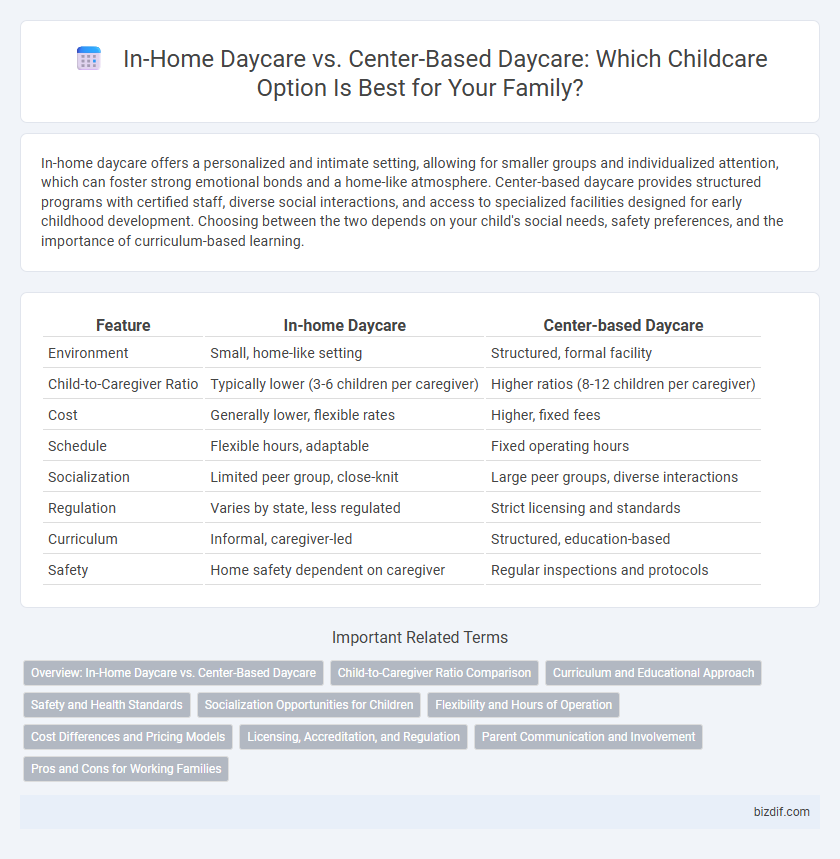In-home daycare offers a personalized and intimate setting, allowing for smaller groups and individualized attention, which can foster strong emotional bonds and a home-like atmosphere. Center-based daycare provides structured programs with certified staff, diverse social interactions, and access to specialized facilities designed for early childhood development. Choosing between the two depends on your child's social needs, safety preferences, and the importance of curriculum-based learning.
Table of Comparison
| Feature | In-home Daycare | Center-based Daycare |
|---|---|---|
| Environment | Small, home-like setting | Structured, formal facility |
| Child-to-Caregiver Ratio | Typically lower (3-6 children per caregiver) | Higher ratios (8-12 children per caregiver) |
| Cost | Generally lower, flexible rates | Higher, fixed fees |
| Schedule | Flexible hours, adaptable | Fixed operating hours |
| Socialization | Limited peer group, close-knit | Large peer groups, diverse interactions |
| Regulation | Varies by state, less regulated | Strict licensing and standards |
| Curriculum | Informal, caregiver-led | Structured, education-based |
| Safety | Home safety dependent on caregiver | Regular inspections and protocols |
Overview: In-Home Daycare vs. Center-Based Daycare
In-home daycare offers a smaller, more personalized setting often run by caregivers in their own homes, fostering a family-like atmosphere with flexible schedules. Center-based daycare typically provides structured programs, certified staff, and various educational activities in a regulated facility designed to support social development among larger groups of children. Choosing between the two depends on preferences for individualized attention versus access to diverse resources and social interaction.
Child-to-Caregiver Ratio Comparison
In-home daycare typically offers a lower child-to-caregiver ratio, often ranging from 3:1 to 5:1, allowing for more personalized attention and tailored care in a home setting. Center-based daycare usually operates with higher ratios, such as 8:1 for toddlers and 12:1 for preschoolers, balancing social interaction with structured activities under regulated standards. Lower ratios in in-home daycare can enhance one-on-one engagement, while center-based settings provide broader socialization opportunities within licensed environments.
Curriculum and Educational Approach
In-home daycare often provides a flexible, personalized curriculum tailored to individual children's developmental needs, fostering close caregiver-child interactions that support emotional and cognitive growth. Center-based daycare typically follows a standardized, research-backed curriculum designed to promote socialization, early literacy, and numeracy skills through structured activities and group learning environments. Both settings emphasize age-appropriate educational approaches, but center-based programs prioritize consistency and accreditation standards that align with state early childhood education guidelines.
Safety and Health Standards
In-home daycare often provides a more personalized and controlled environment, allowing caregivers to closely monitor children's health and safety protocols tailored to individual needs. Center-based daycare facilities are typically regulated by strict state and federal safety and health standards, including routine inspections, staff certifications, and comprehensive emergency procedures. Parents should evaluate both options to ensure compliance with licensing requirements, sanitation practices, and staff-to-child ratios that prioritize child well-being.
Socialization Opportunities for Children
In-home daycare offers a smaller group setting, fostering close-knit social interactions and personalized attention for children. Center-based daycare provides diverse socialization opportunities with larger peer groups, encouraging broader social skills development and group activities. Both settings support social growth, but center-based daycare typically promotes exposure to varied social dynamics and collaborative play.
Flexibility and Hours of Operation
In-home daycare typically offers greater flexibility with customized hours tailored to parents' schedules, often providing early morning, evening, and weekend care options. Center-based daycare usually operates within fixed hours, commonly from 7 AM to 6 PM, aligning with standard business hours but less accommodating for non-traditional work shifts. Families seeking adaptable child care arrangements frequently prefer in-home daycare due to its personalized scheduling and extended availability.
Cost Differences and Pricing Models
In-home daycare typically offers lower hourly rates ranging from $4 to $10 compared to center-based daycare, which averages between $8 and $20 per hour due to higher facility and staffing costs. Pricing models for in-home daycare often involve flexible, personalized plans with fewer rigid hours, while center-based daycare usually requires fixed weekly or monthly fees reflecting comprehensive amenities and structured programs. Families seeking cost-effective solutions may prefer in-home daycare for affordability, whereas center-based daycare provides predictable pricing with regulated care standards.
Licensing, Accreditation, and Regulation
In-home daycare providers often operate under state licensing regulations that vary widely, with some requiring background checks and basic training, while center-based daycares typically adhere to stricter licensing standards and comprehensive state inspections. Accreditation from organizations like the National Association for the Education of Young Children (NAEYC) is more common in center-based facilities, reflecting higher benchmarks for curriculum, staff qualifications, and safety. Regulatory oversight in center-based settings usually includes standardized staff-to-child ratios and facility requirements, whereas in-home daycares may have more flexible regulations but less formal oversight.
Parent Communication and Involvement
In-home daycare offers personalized parent communication through direct interactions and consistent updates, fostering a close caregiver-child-family relationship. Center-based daycare utilizes structured communication methods such as digital apps, newsletters, and scheduled parent-teacher conferences to keep families informed and involved. Both settings prioritize parental involvement but differ in scale and formality of communication channels, impacting engagement levels.
Pros and Cons for Working Families
In-home daycare offers personalized care and a home-like environment, often with flexible hours that suit working families' schedules, but may lack the structured curriculum and extensive resources found in center-based daycare. Center-based daycare provides socialization opportunities and professional staff with specialized training, yet it can involve rigid hours and higher costs, which may challenge working parents. Working families must weigh the intimate attention of in-home care against the educational and social benefits offered by center-based facilities.
In-home daycare vs Center-based daycare Infographic

 bizdif.com
bizdif.com